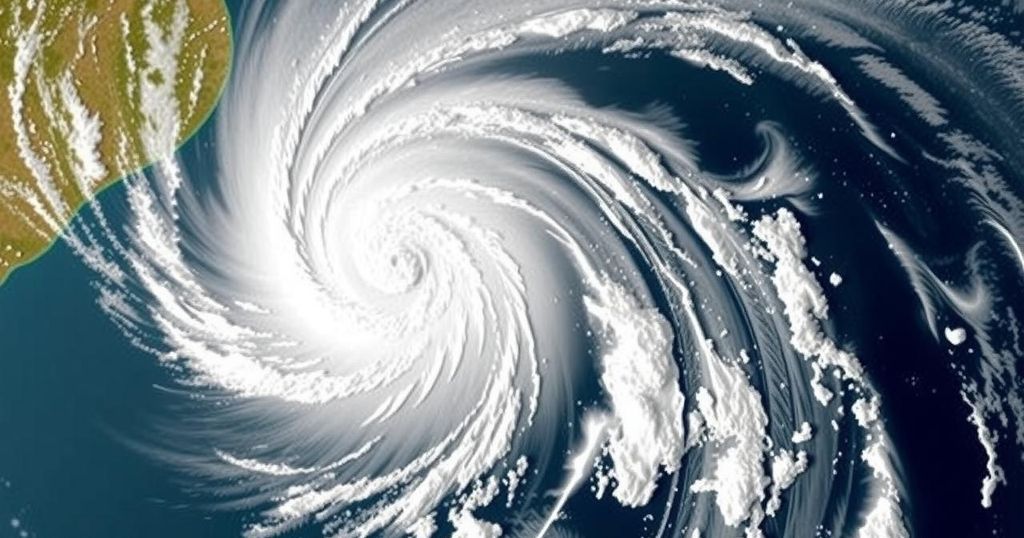Malawi on High Alert as Tropical Cyclone Chido Approaches

Malawi is on high alert for Tropical Cyclone Chido, expected to bring heavy rains and flooding to the southern part of the country. The cyclone is maintaining maximum winds of 250 kilometers per hour and may impact 11 districts. Residents are advised to evacuate flood-prone areas, and the World Food Program is prepared for food assistance amidst ongoing challenges from El Niño weather conditions.
Malawi is currently on high alert as the country braces for the impending impact of Tropical Cyclone Chido. Meteorological authorities have indicated that the cyclone, which is situated northeast of Madagascar in the Indian Ocean, may bring severe rainfall and cause considerable flooding, especially in the southern regions of Malawi. With maximum winds recorded at 250 kilometers per hour, the cyclone is expected to maintain this intensity as it gradually moves westward, posing a significant risk as it approaches landfall near Nacala, Mozambique, scheduled for Sunday.
The Malawi Department of Climate Change and Meteorological Services has provided updates that indicate Cyclone Chido could traverse 11 districts in southern Malawi, which include Mangochi, Machinga, Phalombe, Balaka, Mulanje, Blantyre, Thyolo, Chiradzulu, Zomba, Mwanza, and Neno. Following the cyclone’s landfall, heavy rains and flooding are anticipated to persist until Tuesday, necessitating urgent preventive measures.
Chipiliro Khamula, spokesperson for the Department of Disaster Management Affairs, emphasized the urgency of the situation, advising residents in flood-prone areas to evacuate to safer locations and adhere to official evacuation orders. “We have alerted all [district] councils and activated all clusters for swift preparatory and anticipatory actions,” he stated, elaborating on the agency’s readiness to deploy a comprehensive search-and-rescue team.
This cyclone arrives a year after the devastation caused by Cyclone Freddy, which resulted in over 1,000 fatalities and extensive damage to agriculture in southern Malawi. Additionally, Malawi is currently grappling with challenges stemming from El Niño weather patterns, which have contributed to drought conditions and food shortages affecting more than 25% of its 20 million population.
Paul Turnbull, the country director for the World Food Program in Malawi, indicated that the organization is prepared with available food stocks to support both the government and the affected population. He mentioned, “These stocks were mainly intended to be food assistance for people affected by El Nino as the requirement for El Nino persists.” Turnbull further noted that, should there be a need for supplemental food assistance in response to Cyclone Chido, the WFP would seek support to maintain ongoing aid efforts linked to the El Niño crisis.
Tropical Cyclone Chido poses a significant risk to Malawi, particularly in the southern regions, with expectations of heavy rain and flooding. The cyclone is still gathering strength northeast of Madagascar, potentially impacting numerous districts as it approaches landfall in Mozambique. This situation comes in the wake of previous cyclone-related tragedies and amidst ongoing challenges posed by El Niño weather patterns, which have exacerbated food insecurity in the country. The government and various humanitarian agencies are preparing to respond to the anticipated disaster, emphasizing the importance of community safety and aid readiness.
In summary, as Malawi prepares for Tropical Cyclone Chido, significant attention is directed towards mitigating potential flooding and ensuring community safety, particularly in vulnerable districts. The legacy of past cyclones underscores the urgency of these preparations, while ongoing food insecurity further complicates the situation. Agencies like the World Food Program are mobilizing resources to address both the upcoming challenge of Cyclone Chido and the persistent effects of El Niño, highlighting the intertwined nature of climate-related disasters and humanitarian assistance in the region.
Original Source: www.voanews.com






